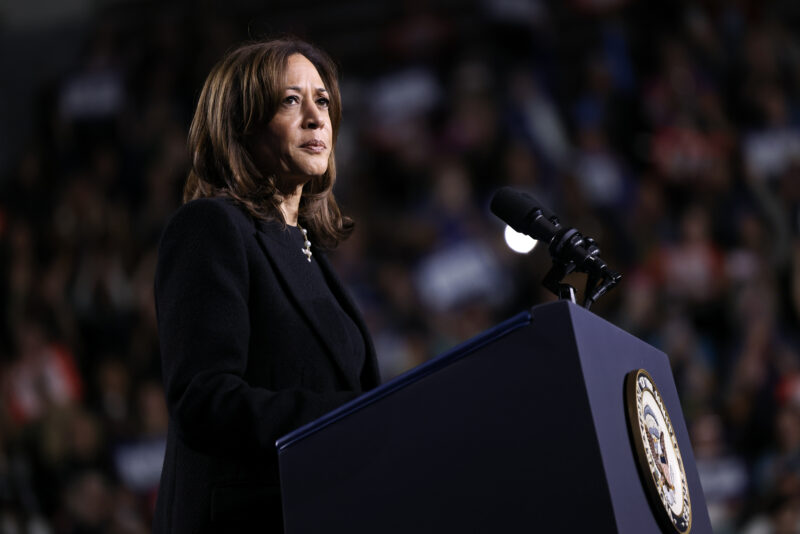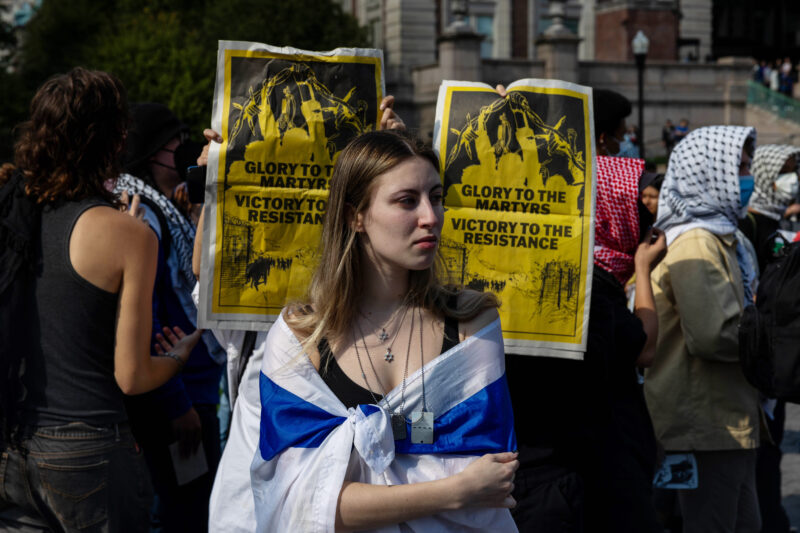White House sticks to script on negotiations after Hamas’ murder of hostages
The administration continues to pressure Israeli Prime Minister Netanyahu to make concessions as part of a wide-ranging deal

Anna Moneymaker/Getty Images
President Joe Biden speaks alongside British Prime Minister Keir Starmer to reporters before participating in a bilateral meeting in the Oval Office of the White House on July 10, 2024
In the aftermath of Hamas’ murder of six Israeli hostages over the weekend, including U.S. citizen Hersh Goldberg-Polin, several top Biden administration officials on Tuesday asserted that the need to reach a cease-fire and hostage-release deal is more urgent than ever. While the officials reiterated that the hostages’ deaths add urgency to Washington’s monthslong quest to mediate a deal, they did not say how, or if, the weekend’s events would affect their approach to the negotiations.
At times, officials spoke about talks that had taken place last week, describing the Biden administration’s commitment to a deal as an extension of those talks — making clear that Hamas’ killing of the hostages did not fundamentally shift what the U.S. hopes to see from a deal.
“During talks last week, we made progress on dealing with the obstacles that remain, but ultimately, finalizing an agreement will require both sides to show flexibility,” White House national security spokesperson John Kirby said at a press briefing. “It will require that both sides look for reasons to get to yes, rather than reasons to say no.”
Comments by Kirby and State Department spokesperson Matthew Miller indicate that the Biden administration is still putting pressure on both Israel and Hamas to reach the deal. Miller, though, acknowledged the awkwardness of Hamas being a negotiating partner and criticized the terror group’s recalcitrance in reaching a deal.
“Sometimes we talk about the negotiations between Israel and Hamas and talk about them as two — and people think about them as two equal parties,” said Miller. “Hamas’ position is that it will execute those hostages rather than let them be released. I think that shows what a depraved organization Hamas actually is.”
President Joe Biden and Vice President Kamala Harris both released forceful statements soon after the hostages’ deaths were announced. Biden vowed to make Hamas pay for their actions, and Harris said Hamas must be removed from power in Gaza.
A Biden administration official told Jewish Insider on Tuesday that the demand that Hamas be removed from power “has been a longstanding position” of this administration — to be worked out only after a cease-fire and hostage-release deal is completed.
Harris’ comment that Hamas cannot control Gaza, according to the official, was referring not to cease-fire negotiations but to “our day-after plans on governance, and how we want a reformed PA [Palestinian Authority] to govern a united West Bank and Gaza.”
“The cease-fire talks are about the actual cease-fire. The day-after plans on governance, reconstruction, security arrangements are longer term,” the official added.
On Tuesday, the Justice Department charged Hamas leader Yahya Sinwar and five of his deputies for their roles in planning and executing years of terrorist attacks in Israel, including the Oct. 7 attacks last year. When asked what Biden meant by saying Hamas will pay, a White House spokesperson pointed to the indictment released Tuesday by the DOJ.
But Miller said Washington’s general approach to taking on Hamas remains unchanged, and when asked if the U.S. would consider giving Israel additional resources to make Hamas “pay,” he said, “No, there’s been no change to our strategy.”
Speaking to Jewish voters on Tuesday evening, Second Gentleman Doug Emhoff described Harris’ work alongside Biden in recent days to push forward a hostage deal. Harris and Biden met with national security advisors on Monday in the Situation Room.
“They were discussing next steps on the cease-fire and hostage deal and how we can make progress to bring the hostages home and relieve the suffering in Gaza. They know the murders only make this work more urgent,” said Emhoff. “She’s never going to rest until the Americans and all the hostages are reunited with their loved ones.”
A key sticking point in the negotiations is the handling of the Philadelphi Corridor, the land border between Gaza and Egypt. On Monday night, Israeli Prime Minister Benjamin Netanyahu insisted that the Israel Defense Forces would not give up the corridor, despite negotiators previously agreeing to at least lowering the number of troops there.
“I’m not going to get into a debate with the prime minister of what he said over the weekend about the Philadelphi Corridor,” Kirby said, but hinted at a disagreement with Netanyahu.
The “bridging proposal” that U.S. negotiators have been working on in recent weeks “included the removal of Israeli Defense Forces from all densely populated areas, and that includes those areas along that corridor. That’s the proposal that Israel had agreed to,” added Kirby. “The deal says that they have to remove IDF from all densely populated areas in Phase One, and that includes densely populated areas around or adjacent to the Philadelphi Corridor, where it intersects with those densely populated areas.”
“I am sure the White House was not thrilled that Netanyahu went public yesterday in saying forget about leaving Philadelphi. Usually you want wiggle room, but Bibi has chosen the opposite approach,” said David Makovsky, a distinguished fellow at The Washington Institute for Near East Policy.
Netanyahu’s comments earned praise from some Republican lawmakers, but most Democrats have largely stayed silent on the issue.
Sen. John Fetterman (D-PA) is the only Democratic lawmaker who has publicly expressed support for Netanyahu’s plan thus far, saying on X, “Unconditional support for Israel to free all remaining hostages, hold the Philadelphi line, and prosecute Hamas to neutralization.”
Sen. Peter Welch (D-VT), one of the most outspoken critics of Israel’s operations in Gaza in the Senate, accused Netanyahu of obstructing a deal.
“Prime Minister Netanyahu is once again putting his counterproductive war strategy before the lives of innocent people — instead of advancing a cease-fire, he has placed the safe return of the remaining hostages in greater jeopardy, emboldened Hamas terrorists, and worsened the humanitarian crisis in Gaza,” Welch said in a statement to JI. “Netanyahu’s shortsighted intransigence is noticed around the world.”
A spokesperson for Rep. Adam Schiff (D-CA) said he remains hopeful about a deal that will permanently debilitate Hamas.
“Congressman Schiff hopes that a cease-fire deal can be reached soon that brings home the hostages, provides Israel with the security it needs to prevent Hamas from rearming and reconstituting its forces, and delivers much needed humanitarian relief to the Palestinian people,” the Schiff spokesperson said.
Netanyahu’s position on the Philadelphi Corridor earned greater support from Republican lawmakers.
Sen. Rick Scott (R-FL), one of the Republicans running to replace Senate Minority Leader Mitch McConnell (R-KY) as GOP leader, said he thinks the U.S. should support Israel taking whatever steps necessary to ensure the destruction of Hamas.
“I trust Prime Minister Netanyahu to do what’s right for Israel as it fights to defend itself from these brutal Iran-backed Hamas terrorists. It is clear that until Hamas is destroyed, the threat it poses to Israel and the U.S. will not be eliminated,” Scott told JI in a statement. “Hamas is still holding 60+ [living] hostage[s] and just murdered an American. If holding the Philadelphi Corridor ensures the destruction of these terrorists, that’s exactly what Israel should do with America’s full and unconditional support.”
Rep. Mike Lawler (R-NY) also suggested he supports the Israeli government’s strategy.
“The fastest way for this conflict to end is for Hamas to surrender and release the remaining hostages — including 7 Americans,” Lawler told JI. “Barring that, Israel should continue conducting the war as necessary to eliminate the threat posed by Hamas, save the hostages, and hold those responsible for the October 7th terrorist attack accountable.”
Hundreds of thousands of Israelis took to the streets of Tel Aviv and other cities on Sunday night to protest Netanyahu’s handling of the war, demanding the Israeli premier quickly negotiate a deal. It’s too early to say whether the killing of the six hostages will mark a breakthrough in the talks, but so far such a breakthrough has remained elusive.
“It doesn’t appear that Team Biden is about to pull a magic Middle East peace bunny out of a hat here,” Brian Katulis, a senior fellow at the Middle East Institute, told JI. “The Biden team has been saying publicly and in private briefings for months that the cease-fire deal is its Plan A, and that there was no Plan B. It should’ve had a Plan B in the works.”
Jewish Insider’s Marc Rod and Emily Jacobs contributed to this report.










































